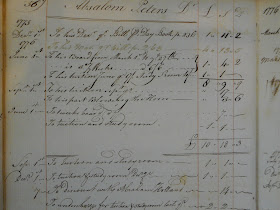 |
| Some of the students expelled in 1896, who called themselves the "Backbone of '98" |
Though this tradition changed over time, at its height 100 to 200 masked students would surround the house of the unlucky professor in the middle of the night. They would then blow a variety of extremely noisy tin horns. Not content with simply disturbing the peace, they would sometimes tear down fences and throw rocks or other objects through the windows.
It is not known when the practice of horning began, though an entry in an early account book notes that Absolum Peters was charged 3 Shillings and 6 pence “To his part blowing the horn,” in 1776. The first mention of horning by name appears in the October, 1868 edition of The Dartmouth. It is clear from this article that the practice had been going on for some time.
 |
| Ledger entry for Absolom Peters |
 |
| The resolution against horning written by President Tucker and signed by representatives of the student body |
Since then, students have found more appropriate and restrained means of dealing with complaints related to difficult assignments, capricious deadlines and complaints about grades.
To learn more, ask for:
Ledger B (DA-2 box 1746, p. 56 Absolom Peters)
Ruben Dearborn to Asa Dodge Smith, (Ms 868557.2)
The Dartmouth vol. 15 December 1, 1893, p 114
Resolution against Horning (Mss 896151)
Belknap, James, Class of 1898 Alumni File
Horn (Realia 10)
The “Horning” Episode,” The Dartmouth vol. 17 p. 303-5
The vuvuzela of its day!
ReplyDeleteI wonder, could Absalom's ledger entry be a credit, since 9 shillings minus 6 leaves 3? Students were paid to blow the conch shell to mark the beginning and end of classes in place of a bell.
Interesting point. I'd have to look at the entries a bit more carefully, but this a double entry accounting and the charge falls in the debit side, so I assume not this does not represent a credit.
ReplyDeletePeter Carini
College Archivist